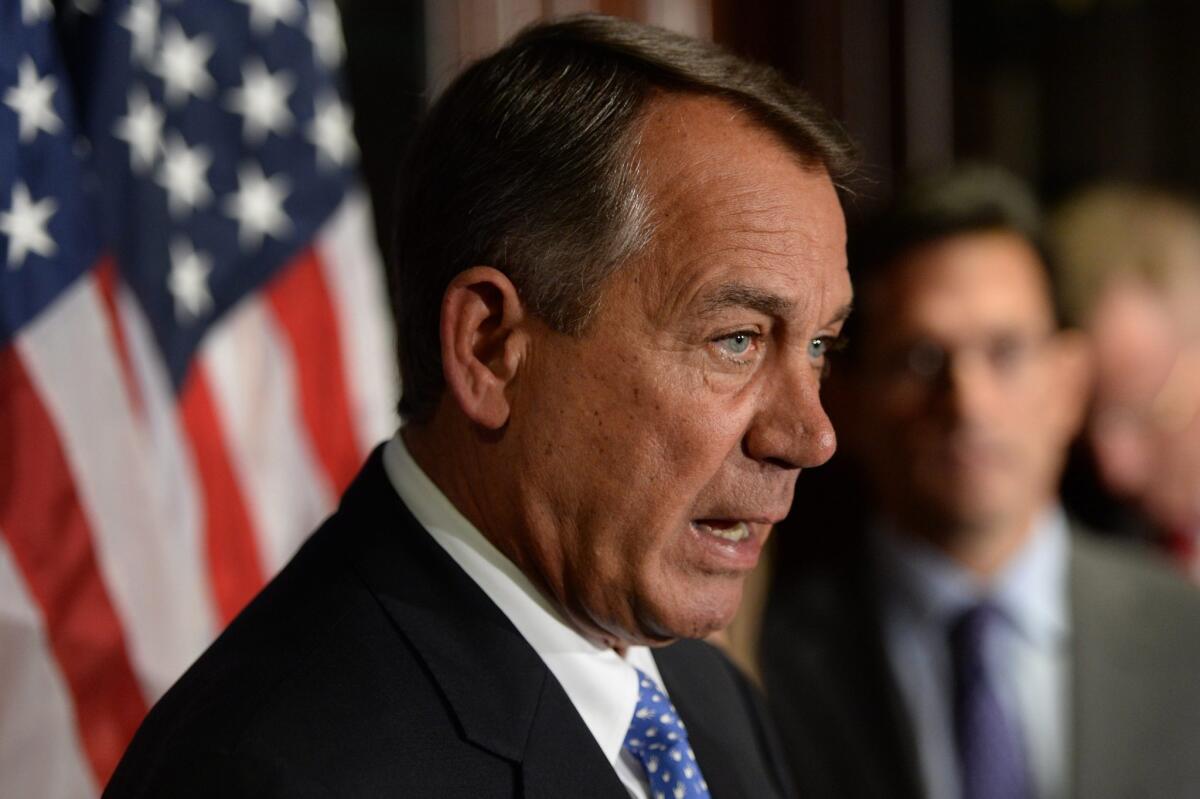A to-do list for Republicans

The feeling inside the GOP these days can be summed up in a paraphrase of a line by an old French Marxist: “Hell is other Republicans.”
After a government shutdown that was foreseen as a failure even by many of those who haplessly provoked it, the party cannot agree on how to undermine President Obama’s agenda while advancing its own. Should it embrace the full-frontal militancy favored by the tea party and agitators like Heritage Action for America and RedState.com, or the carefully leveraged parliamentary thrusts preferred by the GOP’s congressional leadership team?
Republicans in Washington have at least one thing in common, however: Even if they weren’t spooked by warnings of economic calamity, they were all sobered by polls suggesting a majority of voters blamed the GOP for the crisis. And that could give the Republican leaders who internally warned against a shutdown more leverage over their members than they have had for months.
PHOTOS: Tea party backlash: Protest signs to cheer you up
Here’s how they should take advantage of this otherwise grim moment and begin recovering from a serious strategic error.
The first step is the most basic and most urgent: to prove to the country that Republicans are capable of governing. Obama would like very much to sign a comprehensive immigration bill into law. Republicans are split on the merits of a measure passed earlier this year by the Senate. At the risk of sounding willfully calculated, there is little urgency to bring this flawed bill to the finish line; the midterm electorate is older and whiter than in presidential years, and the odds that voters will punish Republicans for failing to resolve the legal status of undocumented immigrants seem remote.
There is plenty of other important business to attend to, however. Topping the list is the so-called farm bill — a grab bag of agricultural support programs that hung fire last summer because of the tea party’s insistence on steeper cuts to food stamps than Democrats could stomach. Since both sides agree that spending on food assistance should decline as the economy recovers, a deal on precisely how much shouldn’t be impossible to reach.
With a good farm bill, Republicans have a chance to show the country they are serious about government reform — if they can muster the courage of their convictions. To do so, the party must demonstrate that it is as serious about weaning agribusiness off federal subsidies as it as about controlling spending on the needy.
Also on Republicans’ radar are bills to overhaul federal transportation and water infrastructure programs. These aren’t headline grabbers, but they are an opportunity to demonstrate that the party can function legislatively.
After the “fiscal cliff” showdown that Congress resolved on New Year’s Day, the talk in Washington was of eschewing secret backroom budget negotiations and returning to “regular order.” With Senate Minority Leader Mitch McConnell all but ruling out another shutdown and debt ceiling standoff next year, Republicans have no choice but to try to make good on this promise.
Can lawmakers reach some kind of detente on long-term taxes and spending or, more immediately, on the question of replacing the automatic spending cuts stipulated by 2011’s budget sequestration policy? Democrats have rejected the idea of pairing sequestration relief with cuts to entitlement programs such as Medicare and Social Security.
Yet Senate Finance Committee Chairman Max Baucus suggested recently that the two parties aren’t far apart on an effort to reduce corporate tax rates. Both sides also have signaled a willingness to cap income tax deductions by the wealthy. How about a compromise on sequestration and lower corporate rates, paid for by a reduction in tax breaks for high earners?
Whether or not a bargain of any significance is struck on the budget, the two parties will remain deeply divided on Obamacare. Upcoming oversight hearings in the House will no doubt highlight all the woeful ways in which HealthCare.gov — the online hub of the law’s insurance exchanges — is stymieing both consumers and insurers.
But conservatives should keep their “I told you so” schadenfreude in check. Technological farce in this case shouldn’t trump personal tragedy: Hundreds of thousands of people are trying and failing to gain a foothold in the health insurance marketplace. This is not a fate that conservatives should openly root for.
That’s why it’s imperative that Republicans introduce a serious conservative alternative to the Affordable Care Act, one that offers refundable tax credits to individuals who don’t have access to health insurance through their jobs and that adequately funds high-risk insurance pools. This will cost more money than Republicans have hitherto been willing to spend, but it’s a bargain compared to Obamacare’s escalating price tag.
The overarching task for Republicans is to lower their profile and do the job they’re paid to do. Come November 2014, they can only hope a majority of voters believes they can govern constructively, not merely resist destructively.
Scott Galupo is a senior contributor to the American Conservative and former staff writer for the Washington Times.
More to Read
A cure for the common opinion
Get thought-provoking perspectives with our weekly newsletter.
You may occasionally receive promotional content from the Los Angeles Times.










